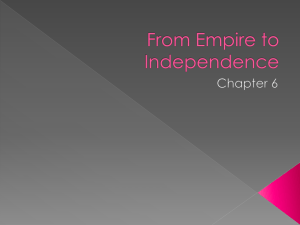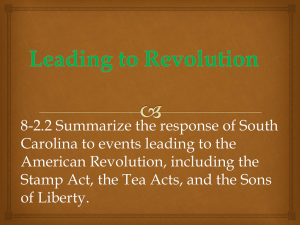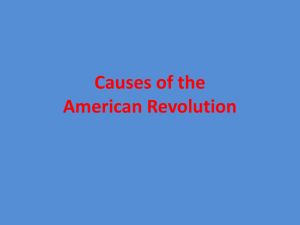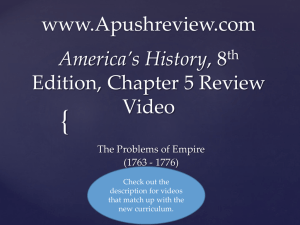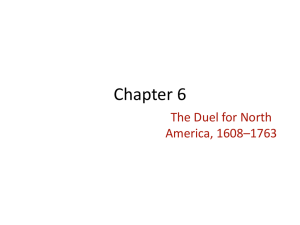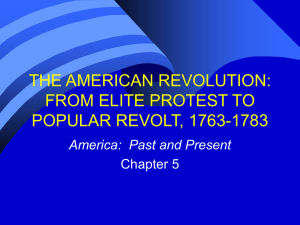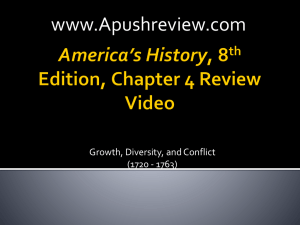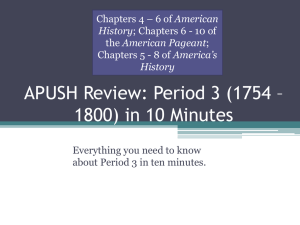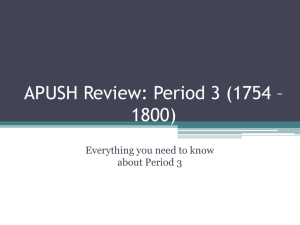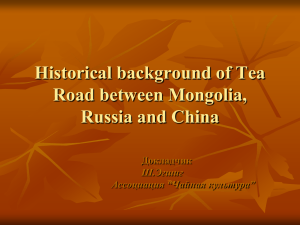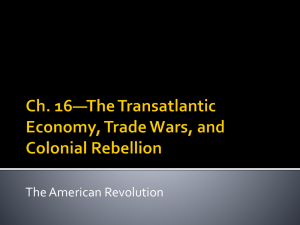Unit 6b class - PollocksUSHistoryClass
advertisement
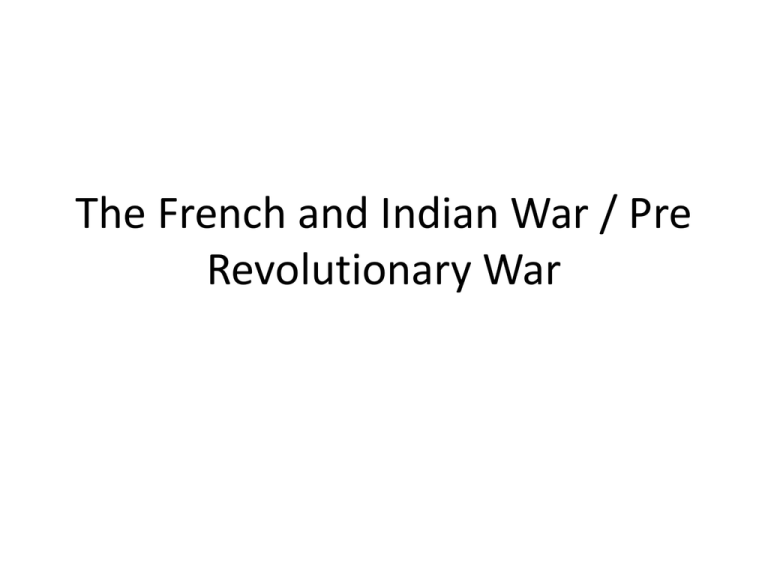
The French and Indian War / Pre Revolutionary War North America in 1750 Vocabulary 1. Petition Definition- A written request to someone signed by a group of people 2. Boycott Definition – refuse to buy certain goods and services 3. Repeal Definition – to take back; cancel 4. Militia Definition – an army of untrained, citizen, soldiers 5. Intolerable Definition – something you can’t stand 6. Delegates Definition – representatives 7. Duties Definition – taxes on goods 8. Parliament Definition – the British Law makers (like our Congress) 9. Blockade Definition – to prevent things from getting through 10. Mercantilism Definition – a system of economy where a country exports more than it imports 11. Effigies Definition – a representation of a disliked person (dolls) 12. Turmoil Definition – a state of extreme confusion 13. Proprietor Definition - Owner 14. Minutemen Definition – army that could be assembled very quickly 15. Martyr Definition – someone who dies for a cause or a belief. 16. Synonym Definition – word that means the same thing 17. Antonym Definition – word that means the opposite 18. Rivals Definition – people or groups that compete against each other. Vocabulary Quiz Today…..Have your sentences ready to hand in!!! vs. 1753 - 1763 North America in 1750 Cause of French & Indian War Study the map and describe one cause of the French and Indian War? I. French and Indian War A. 3 European Rivals in North America 1. England, France, and Spain a. England controlled the most important land, the biggest threat was from France b. France built Forts to prevent Westward Expansion 2. Native Americans choose sides a. French were friends of Indians; adopted some of their ways and built alliances b. English settlers took their land, ignored their rights, and cleared their forests. B. The War Begins 1. The French and British fought 3 times between 1689-1748 2. 1754 – 4th time = French and Indian War a. Great Britain vs French and the Indian Allies 3. George Washington led the opening battles a. 22 years old b. Sent by government of VA to build a fort in Ohio but Fort Duquesne is already there c. Washington attacked the fort but lost the battle and was captured and released. Objective: To analyze the importance of the Albany Plan of Union and the causes and effects of the French and Indian War. Do Now: Which European countries were competing for land in North America? - Great Britain - France - Spain French and Indian War (1754 – 1763) Causes: Britain began to compete with France over the fur trade in the Ohio Valley. Some French people began moving to the American colonies from Canada. Canada Colonies England and France were at war. England did not want to lose the colonies to the French, so the English asked the colonists to help them fight against the French. The French asked some American Indians to help them fight against England and the colonists. The Maryland people did many things to protect their colony. The governor asked the citizens to build three forts along the western frontier. Fort Frederick was the largest of these forts. The fort’s walls were made of stone. The settlers built houses inside for soldiers to use. General Braddock, along with George Washington, trained soldiers at Fort Cumberland. 1754 The First Clash The Ohio Valley British Fort Necessity * George Washington French Fort Duquesne * Delaware & Shawnee Indians • A combined force of French soldiers and their native allies overwhelmed Fort Necessity on July 3, 1754, marking the start of the “French and Indian War” in North America. The French permitted Washington and his men to return to Virginia safely, but made them promise they would not build another fort west of the Appalachian Mountains for at least a year. England did not officially declare war until 1756, although the conflict had actually begun two years earlier at Fort Necessity. (French and Indian War Hero Example) Come up with a creative Title (top of the page) It was July 9, 1755 and I was preparing myself for battle against the French and Indian armies located at Fort Duquesne. King George III • King of Great Britain from 1760 to 1820. Under his guidance, Britain won the French and Indian War but lost the Revolutionary War. He was mentally unstable because of a disease called porphyria, and he was given to bouts of madness and unpredictability. He also didn't like his government officials very much. C. Albany Congress 1. Delegates from 7 colonies meet to plan a Colonial defense 2. Ben Franklin and the Albany Plan of Union a. Wanted a colonial Government b. Plan failed when none of the colonies would give up power D. A string of British Defeats 1. Britain attacked first but France had sharpshooters who picked off the British (Bright Red Uniforms) 2. Britain had a two year losing streak E. Turn of Events 1. General Pitt is elected as leader of Britain 2. Sends over the best generals and weapons 3. 1759 – Britain attacks the capital of New France (Quebec) a. In any war, the capital is the most important city to take over 4. Treaty of Paris – 1763 a. Signed by France and Britain b. Officially puts an end to the war c. Britain gets all the land East of the Mississippi River and Canada d. Spain gives up Florida but gets all land West of the Miss. River and keeps New Orleans Albany Plan of Union • The Albany Plan of Union, proposed by Benjamin Franklin and Massachusetts governor Thomas Hutchinson, called for colonial unity in the face of the coming war with France. 1754 Albany Plan of Union Ben Franklin representatives from New England, NY, MD, PA A Albany Congress failed Iroquois broke off relations with Britain & threatened to trade with the French. • The Albany Plan of Union called for a Grand Council with representatives from each colony. • The Grand Council would: - make laws - raise taxes - defend the colonies • None of the colonies approved the plan out of fear of losing power. * The Albany Plan of Union set an example that would later be followed by such gatherings as the First and Second Continental Congress. William Pitt The right man, at the right time, and in the right place can make all the difference. Secretary of State Prime Minister Military Logistician Excellent Judge of Military Commanders Global Thinker North America in 1763 1. England and the Colonists beat the French and the Indians. 2. The Treaty of Paris was formed between the opponents. 3. This war was very costly to England. The British decided to tax the Colonists to pay for the war! King George III • King of Great Britain from 1760 to 1820. Under his guidance, Britain won the French and Indian War but lost the Revolutionary War. He was mentally unstable because of a disease called porphyria, and he was given to bouts of madness and unpredictability. He also didn't like his government officials very much. Objective: To examine how and why Britain raised taxes in the colonies. Do Now: 1) What was the Proclamation of 1763? Proclamation of 1763 – forbade British settlers from settling west of the Appalachian Mountains. 2) Why did Great Britain create it? The Proclamation of 1763 was created in order to protect settlers from Native American attack. 3) How did most American settlers respond to the law? Many settlers ignored the law. BACKLASH! British Proclamation Line of 1763. Colonials Paxton Boys (PA) …SUGAR Sugar Act (1764) …MOLASSES …COFFEE Taxes put on… …INDIGO Rethinking Their Empire Br. Gvt. measures to prevent smuggling: A 1761 writs of assistance James Otis’ case Protection of a citizen’s private property must be held in higher regard than a parliamentary statute. He lost parliamentary law and custom had equal weight. Stamp Act Crisis The French and Indian War put Britain deeply in debt. C A U S E D British Prime Minister George Grenville persuaded Parliament to pass the Sugar Act and Stamp Act. ...NEWSPAPERS (New York Gazetteer, Feb. 15, 1775) Stamp Act (1765) ...LEGAL DOCUMENTS Taxes put on… …DICE …PLAYING CARDS The Stamp Act ignited an angry response from the colonists, To the right, a tax collector is tied to a pole by an unruly crowd. A British loyalist is secured at the bottom of pole. Tar and Feathering United Kingdom (Ireland, except for the North, received their independence from Britain in 1921) British Parliament The Scots are represented in Parliament! “Taxation without representation is tyranny!” - James Otis The English are as well! Hey, the Irish don’t have representation either! (not until 1800, anyway) So are the Welsh! • The colonists protested and were angry about “taxation without representation”. Irony - The use of words to express something different from and often opposite to their literal meaning. What is ironic about this license plate? One of the major complaints of the American colonists was “taxation without representation”. Yet, residents of Washington, D.C. are currently taxed without being represented in Congress. Stamp Act Congress (1765) The colonists… • rejected the Stamp Act. • declared their loyalty to Britain. • asserted that Parliament had no right to tax the colonies. * Slogan Example: ‘No Taxation Without Representation!’ Visual Example Description Example Use your notes and the book to describe the cause and effect of the tax/act. * In 1766, Parliament repealed the Stamp Act. Alright, alright! We’ll repeal the Stamp Act! Will that make you bloody American hooligans happy! Now, end your boycott already! King George III - funeral procession to the tomb of the Stamp Act; - principal proponent, Treasury Secretary George Grenville, carries a child's coffin marked "Miss Ame-Stamp born 1765 died 1766." Townshend Acts (1767) • Items such as glass, paper, paint, lead, and tea were taxed. • Writs of assistance were used to search for smuggled goods. C A U S E D • Colonists signed nonimportation agreements, continuing their boycott of British goods. • More people joined the Sons and Daughters of Liberty. – groups which protested against British policies. Here Lies Buried James Otis Orator and Patriot of the Revolution Famous for his argument Against Writs of Assistance Born 1725 Died 1783 Massachusetts Society Sons of the Revolution 1898 • The British repealed the Townshend Acts, except for the tax on tea. Quartering Act • The colonists had to provide candles, bedding, and beverages to British soldiers. • Because the New York assembly refused to obey the law, Britain dismissed the assembly. Gracie Mansion Late 18th Century Federal style Mansion, Official Residence of Mayor of New York. The Boston Massacre (March 5,1770) Boston Massacre 1) Boys began to throw ice at a British guard. Hey kid, I wouldn’t do that again if I were you! Boston Massacre 2) A crowd soon grew large and rowdy. 3) The British soldiers opened fire, killing five colonists, including Crispus Attucks, a black sailor active in the Sons of Liberty. “John Adams” HBO Miniseries – Boston Massacre Scene Crispus Attucks, the First Martyr of the American Revolution, King (now State) Street, Boston, March 5th, 1770 * On the same day as the Boston Massacre, the Townshend Acts were repealed, except for the tax on tea! II. Turmoil Over Taxation A. Proclamation of 1763 1. Draw an imaginary line along the Appalachian mountains. a. Colonists could not go West of this line b. Protected the Indians c. 10,000 troops were sent to enforce B. Britain enforces new taxes 1. French and Indian War caused debt 2. In a Mercantilist system, the colonies were expected to serve the main country (England) 3. The Sugar Act 1764 a. Tax on Molasses b. Colonists smuggle it in 4. Stamp Act – 1765 a. Duties on all paper goods b. Colonists protested c. Threw rocks and tarred and feathered tax collectors d. No Taxation without representation e. 1765 – petitions drawn up f. Boycott paper goods g. 1766 - Act repealed 5. Townshend Act – 1767 a. Britain taxes glass, paint, tea, etc. b. Still no representation for the colonists c. Allowed for Writs of Assistance d. Merchants stopped importing goods from Britain e. Formed the Sons and Daughters of Liberty * Hung effigies of British tax collectors C. New Colonial Leaders 1. Samuel Adams – Boston, Mass. a. Against the British b. Arranged protests 2. John Adams – lawyer who took a careful approach 3. Mercy Otis Warren – wrote plays to make fun of the British 4. George Washington and Patrick Henry a. Both in House of Burgesses b. Both protested D. Boston Massacre 1. Quartering Act – colonists had to provide housing for British soldiers in the colonies 2. March 1770 a. Bostonians are sick of British officials and start throwing things at them b. Soldiers fired into the crowd and 5 people died c. Paul Revere made an engraving to remind people d. John Adams defended the soldiers at the trial E. Temporary Calm 1. Most of the acts were repealed 1. How did the colonists react to the passing of the Tea Act in 1773? They boycotted tea and made other things like coffee or liberty tea (made from raspberry). 2. Describe the Boston Tea Party in four or more complete sentences. On December 16th, Sam Adams and the Sons of Liberty dressed up like Native Americans. They went to the Boston harbor and got on the British Ships. They broke open the tea chests and dumped them into the water. When it was done, over 300 chests of tea were in the water. 3. What did the four parts of the Intolerable Acts state? First, Parliament shut down the Port of Boston Second, only one town meeting was allowed per year in Boston Third, any soldiers living in the colonies and charged with crimes were tried in Britain Fourth, a new Quartering Act was passed. Here we are, the British East India Company, with your tea shipment! Ye Old Tea Shoppe Boy, oh boy, this tea boycott is killing my business! Before the Tea Act Tea $8 Ye Old Tea Shoppe Tea $5 After the Tea Act Ye Old Tea Shoppe Tea $5 Tea Act (1773) • The British East India Company was allowed to sell tea directly to the colonists, bypassing the tea merchants. * Although they still paid the tea tax, the price of tea decreased. • If the price of tea decreased, why were the colonists angry? They were angry because… …tea merchants had been cut out of the tea trade. …they thought it was a trick to make the colonists accept the tea tax. • In order to protest against the Tea Act, the Sons of Liberty organized the Boston Tea Party. Boston Tea Party • Approximately 50 or 60 men, dressed as Native Americans, boarded three ships loaded with tea. • All of the tea was thrown overboard into the water. British-American Colonial Tensions Colonials British Methods of Fighting: • Indian-style guerilla Military Organization: • Col. militias served under own captains. • Br. officers wanted to take charge of colonials. Military Discipline: • No mil. deference or protocols observed. • Drills & tough discipline. Finances: • Resistance to rising taxes. • Colonists should pay for their own defense. Demeanor: • Casual, non-professionals. • Prima Donna Br. officers with servants & tea settings. tactics. • March in formation or bayonet charge. Final Essay Starter….. Introductions should be ‘attention grabbers.’ It can either be a question or some interesting fact that draws in the reader. Here is an example…. Did you know that Colonists used to pour hot tar on people and then cover them with feathers? Do you know why? In the following paragraphs I will be covering
